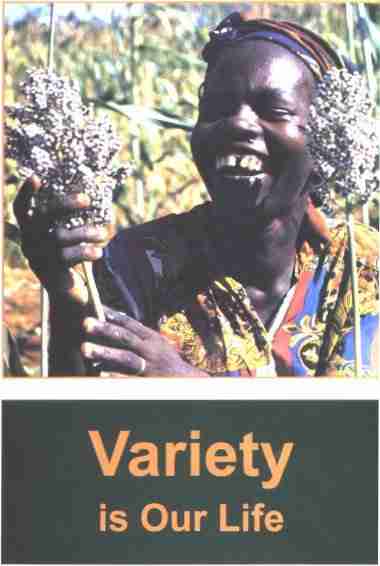|
|
|
FARMERS, FOOD SECURITY & COP V
|
|||||||||||||||||||||
INTRODUCTION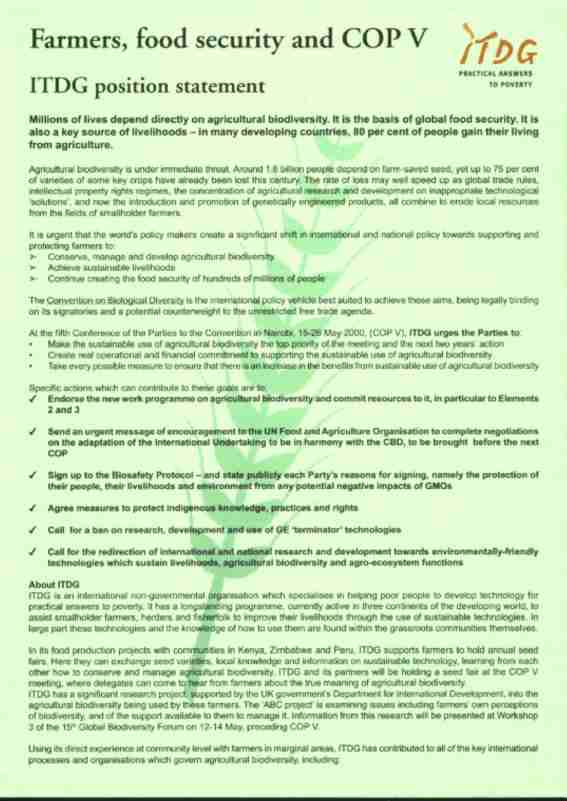 Millions of lives depend directly on agricultural biodiversity. It is the basis of global food security. It is also a key source of livelihoods - in many developing countries, 80 per cent of people gain their living from agriculture. Agricultural biodiversity is under immediate threat. Around 1.6 billion people depend on farm-saved seed, yet up to 75 per cent of varieties of some key crops have already been lost this century. The rate of loss may well speed up as global trade rules, intellectual property rights regimes, the concentration of agricultural research and development on inappropriate technological 'solutions', and now the introduction and promotion of genetically engineered products, all combine to erode local resources from the fields of smallholder farmers. It is urgent that the world's policy makers create a significant shift in international and national policy towards supporting and protecting farmers to:
The Convention on Biological Diversity is the international policy vehicle best suited to achieve these aims, being legally binding on its signatories and a potential counterweight to the unrestricted free trade agenda. At the fifth Conference of the Parties to the Convention in Nairobi, 15-26 May 2000, (COP V), ITDG urges the Parties to:
Specific actions which can contribute to these goals are to:
About ITDG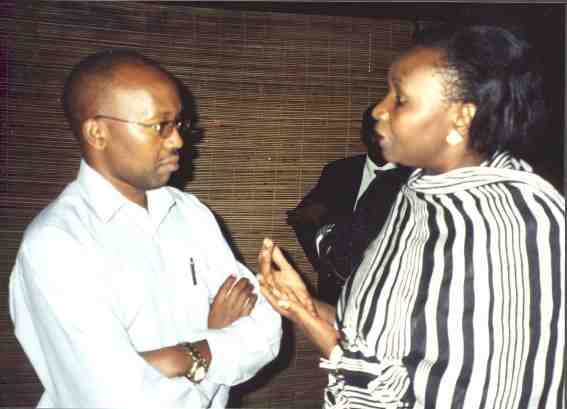 Rowlands Tome and Isabella Masinde, ITDG COP V team leadersITDG is an international non-governmental organisation which specialises in helping poor people to develop technology for practical answers to poverty. It has a longstanding programme, currently active in three continents of the developing world, to assist smallholder farmers, herders and fisherfolk to improve their livelihoods through the use of sustainable technologies. In large part these technologies and the knowledge of how to use them are found within the grassroots communities themselves. In its food production projects with communities in Kenya, Zimbabwe and Peru, ITDG supports farmers to hold annual seed fairs. Here they can exchange seed varieties, local knowledge and information on sustainable technology, learning from each other how to conserve and manage agricultural biodiversity. ITDG and its partners will be holding a seed fair at the COP V meeting, where delegates can come to hear from farmers about the true meaning of agricultural biodiversity. ITDG has a significant research project, supported by the UK government's Department for International Development, into the agricultural biodiversity being used by these farmers. The 'ABC project' is examining issues including farmers' own perceptions of biodiversity, and of the support available to them to manage it. Information from this research will be presented at Workshop 3 of the 15th Global Biodiversity Forum on 12-14 May, preceding COP V. Using its direct experience at community level with farmers in marginal areas, ITDG has contributed to all of the key international processes and organisations which govern agricultural biodiversity, including:
With regard to the genetic modification of organisms for agriculture, ITDG supports the use at all times of the Precautionary Principle, and is a member of the UK Freeze campaign, which supports a moratorium on the use, trade and patenting of GMOs. ITDG is currently researching what kind of methodologies could be used to assess the potential impacts of GMOs on smallholder farmers in developing countries. 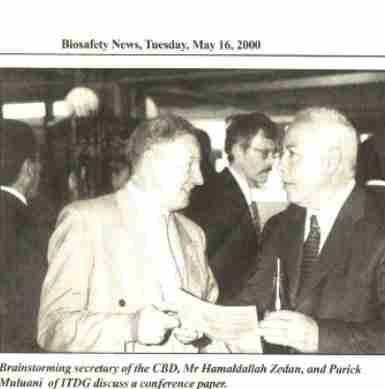 So-called Biosafety News (Organ of the Biotech Industry) upgrades ITDG Position Statement to a COP Paper!Patrick Mulvany presents ITDG Position Statement to Hamdallah Zedan, Executive Secretary to the CBD.Definition of agricultural biodiversityAgricultural biodiversity is a vital sub-set of biodiversity. It is a creation of humankind, whose food and livelihood security depend on the sustained management of those diverse biological resources that are important for food and agriculture. "Agricultural biodiversity includes the variety and variability of animals, plants and micro-organisms which are necessary to maintain the structure, processes and key functions of the agricultural ecosystem for, and in support of, food production and food security." (FAO/SCBD, 1999). Three functions of agricultural biodiversity can be described: 1) Sustainable production of food and other agricultural products; 2) Biological or life support to production emphasising conservation, sustainable use and enhancement of the biological resources that support sustainable production systems, particularly soil biota, pollinators and predators; 3) Ecological and social services provided by agro-ecosystems such as landscape and wildlife protection, soil protection and health (fertility, structure and function), water cycle and water quality, air quality, CO2 sequestration, etc. COP V OPPORTUNITIES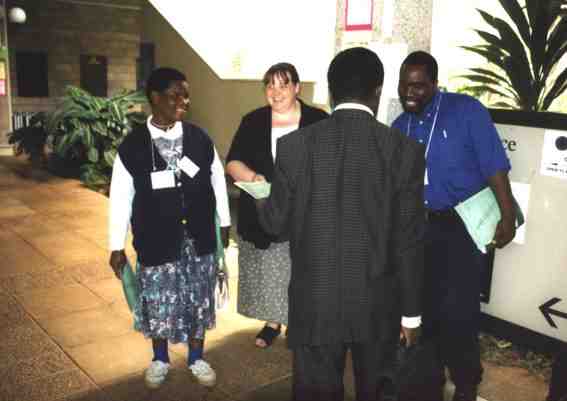 Distributing leaflet to Delegates at COP VRecognition of the nature and importance of agricultural biodiversity within the CBD has been steadily rising in recent years. But COP V presents an unrivalled opportunity for the Parties to act seriously in favour of agricultural biodiversity in ways which could significantly affect its global conservation and management. Many of the international trends which have caused the unacceptable rate of loss of crop varieties and other elements of agricultural biodiversity have been protected and promoted by the global regime of international free trade, including the intellectual property rights frameworks. A new round of trade negotiations in which agriculture and IPRs would have been reviewed could have spelled disaster for the protection of the rights of farmers, herders and fisherfolk to benefit from the genetic resources which they have developed over centuries through the free exchange of germplasm. In the absence of new world trade negotiations, the CBD has the opportunity to exert countervailing influence in another direction - towards supporting these communities to make sustainable use of agricultural biodiversity, and protecting their rights to benefit from it, in particular through the recognition of Community Rights regimes. The CBD can also take measures to diminish new threats such as the introduction of genetically modified organisms. COP V: the settingThis will be the first Conference of the Parties to be held in a country, and a region, where millions of lives depend directly on biodiversity. Up to 80 per cent of people in Kenya and the surrounding region gain their livelihoods from agriculture and pastoralism. Despite 20 years of international policy concentration on increasing agricultural exports from these economies - and opening them to increased imports - smallholder farming and pastoralism remain key to the food security of the majority of the people. This is therefore an opportunity for delegates to the COP to be exposed to the true meaning of agricultural biodiversity, and to offer a much greater commitment to supporting those who manage it. The following sections give some explanatory details of ITDG's position statement and its call for action from the Parties. ISSUES1. New work programme on agricultural biodiversityAs a result of the decisions at SBSTTA 5 on the programme of work on Agricultural Biodiversity, the Secretariat is presenting COP V with a progress report and a new programme of work to be endorsed and implemented over the next two years, the better to protect agricultural biodiversity. This new work programme will oblige all Parties to draw up and implement national action plans for agricultural biodiversity for the first time. It will also create international research and action intended to strengthen communities' management of these resources. ITDG wishes to see the Parties endorse this new work programme but also take real operational action to resource and implement it. ITDG urges the Parties to turn the following two elements of the programme into meaningful action: "Element 2: to identify management practices, technologies and policies that promote the positive and mitigate the negative impacts of agriculture on biodiversity, and enhance productivity and the capacity to sustain livelihoods, by expanding knowledge, understanding and awareness of the multiple goods and services provided by the different levels and functions of agricultural biodiversity. "Element 3: To strengthen the capacities of farmers, their communities and other stakeholders, to manage agricultural biodiversity so as to increase their benefits, and promote awareness and responsible action by producer organizations and agro-enterprises." ITDG believes the ecosystem approach should be integrated into the future work programme through the application of the Trondheim workshop's five central themes: Biodiversity and ecosystem functioning; Benefits and services; Decentralization; Intersectoral co-operation; and Adaptive management. As the workshop concluded: "Ecosystem processes and functions are complex and variable. Their level of uncertainty is increased by the interaction with social constructs, which need to be better understood. Therefore ecosystem management must imply a learning process, which helps to adapt methodologies and practices to the ways in which these systems are being managed and monitored. ITDG urges all Parties to produce and commit themselves to - at national and international level - concrete farmer-centred programmes for the sustainable use of agricultural biodiversity. 2. International Undertaking on Plant Genetic ResourcesFor the last six years there have been negotiations to try to secure an international agreement on access to and use of the plant genetic resources for food and agriculture, developed in farmers' fields and stored in national, regional and international genebanks. The Commission on Genetic Resources for Food and Agriculture, housed within the UN Food and Agriculture Organisation, is charged with leading these negotiations. The aim is to secure an International Undertaking which is adapted to be in harmony with the CBD. During these six years the mandate and scope of these negotiations has been constantly questioned. The conflict is largely between those who wish to see farmers and other stakeholders have free multilateral rights of access to, and benefit sharing from, genetic resources they have developed and use to maintain food security; and those who support bilateral arrangements and the encroachment of intellectual property rights and law into these areas. The pause in world trade negotiations is a vital window of opportunity in which agreement can be strongly pushed for. ITDG urges the Parties to call for agreement this year to an International Undertaking. A strong message of encouragement should be sent to the FAO to achieve this. An International Undertaking which is fully in line with the CBD would ensure:
ITDG urges the Parties to call for such a pro-farmer IU to be brought before the next COP as a legally binding instrument. 3. The Biosafety ProtocolThe wording of the Biosafety Protocol was finally agreed in Montreal in January 2000. It now becomes available at COP V for signature by the Parties. The Biosafety Protocol specifically allows countries, when considering whether to allow the importation of Living Modified Organisms and Genetically Modified Organisms, to take socio-economic considerations into account. Risk assessments can be made of the potential impacts, not only on health and the environment, but also on the agricultural economy and communities. ITDG welcomes the Protocol, and urges Parties to sign up to it forthwith. ITDG believes it will be significant for the future interpretation and use of the Protocol if Parties, when signing up to it in Nairobi, would state publicly why they are doing so, namely for the protection of their people, their livelihoods and the environment from any potential negative impacts from LMOs/GMOs. ITDG also notes that further work is needed, in particular concerning liability and redress. There will be a need to adopt a process for elaboration of international rules and procedures on these issues once the Protocol enters into force, and to have an effective regime in operation by 2005 (3 years after the first Meeting of the Parties in 2002) 4. Protecting Indigenous knowledge, practices and rightsThe CBD is the international instrument which provides a potential framework for the protection of the innovations, knowledge and practices of indigenous peoples - and a formal system for protecting community rights to natural resources. Article 16.5 of the Convention specifically recognises that patents and other IPRs may affect the Convention's implementation, and states that Parties will co-operate to ensure that "such rights are supportive of and do not run counter to its [the Convention's] objectives". This subject will recur throughout the course of COP V as the Parties discuss, for example, Article 8j; issues of access; intellectual property; and relations between the CBD and other Conventions. Article 8j says that a Party shall, "Subject to its national legislation, respect, preserve and maintain knowledge, innovations and practices of indigenous and local communities embodying traditional lifestyles relevant for the conservation and sustainable use of biological diversity and promote their wider application with the approval and involvement of the holders of such knowledge, innovations and practices and encourage the equitable sharing of the benefits arising from the utilisation of such knowledge, innovations and practices." It is a vital matter to the millions who depend directly on agricultural biodiversity that in these discussions, the COP should agree measures to protect indigenous knowledge, practices and rights. Further, the COP should support the development of framework agreements for the national and international recognition of community rights. 5. Terminator, GURTs and alternative directions in research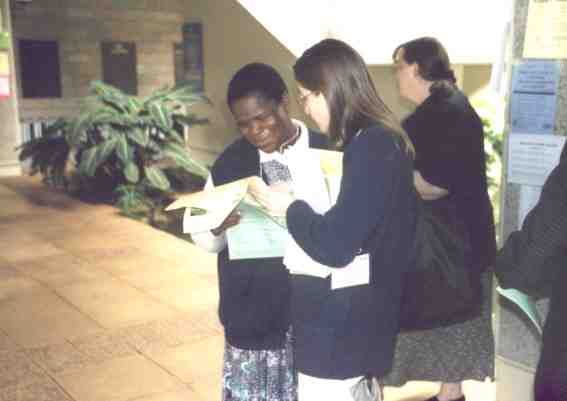 Mrs Mapundu, Zimbabwe farmer, reads her Terminator Speech in RAFI's BioTalkThe early generation of genetic engineering applications to agriculture has included the development of V-GURTS (so-called 'terminator' technologies) which prevent crops from propagating and could force farmers into dependence on purchase of proprietary seed from the biotech/seed transnationals. Under pressure from public opinion, some of these transnationals have disowned the technology or promised not to commercialise it. These promises are a thin protection for farmers against the continuing possibility that 'terminator' seeds may one day come onto the market. Greater biosafety is required, therefore ITDG believes the Parties at COP V should call for a ban on the research, development and use of terminator technologies. The Parties could also express serious concern over the ethical, moral, economic and environmental impacts of T-GURTS, or the trait-specific genetic engineering of seeds, which could also result in limiting access to germplasm. More generally, as stated earlier in this paper, there is growing concern among farming communities worldwide at the extent to which commercial and public international and national resources for agricultural research and development are being concentrated on a small number of expensive technologies which then are promoted as 'solutions' to world food security. In the view of ITDG, and within the spirit and letter of the CBD, solutions to food security must lie with those who manage agricultural biodiversity at field level. ITDG therefore urges the Parties to call for a redirection of research and development towards environmentally-friendly technologies that sustain poor people's livelihoods, agricultural biodiversity and agro-ecosystem functions. Links to further ITDG pages:Farmers' Voices, Farmers' Rights What is COP V? Agricultural biodiversity CBD vs WTO News from COP V Abc research Sustainable livelihoods workshop ITDG Home Page |
